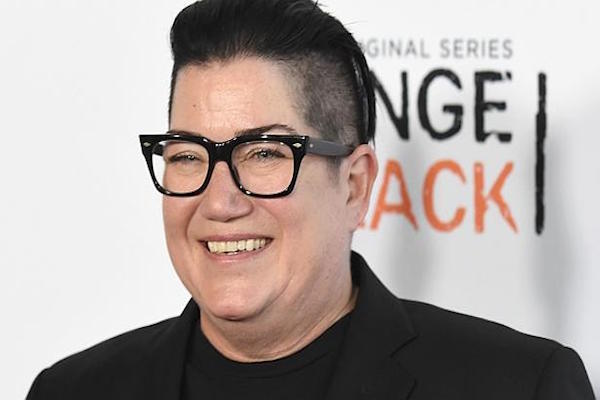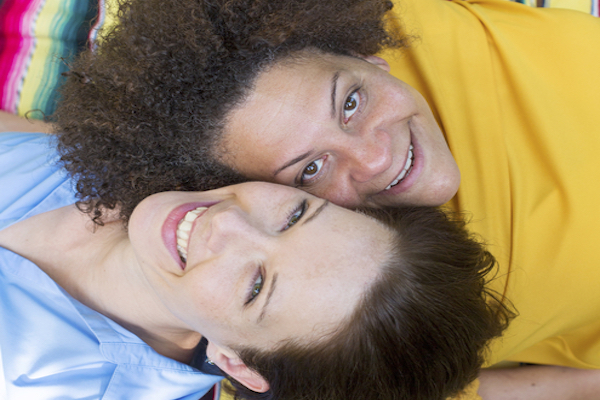There was a time in my life when coming out seemed like the scariest, most inconceivable act in the world. For many years—well into my late 20s—I took great strides to hide my sexuality. My love of makeup, jewelry, and classic shoulder-length hair definitely had its perks. Judging by my outward appearance, one could not discern my sexuality. Conversely, it’s because of my outward appearance that today, people presumably label me as a straight girl.
Coming out once was a necessary step for my mental, personal, and emotional health. It took me years, but I finally worked up the courage to do it. It’s kind of funny to think back on those days, considering that I now have to come out almost every day of my life, in random places and to random people who probably wouldn’t otherwise need to know. I can only credit this phenomenon to my femme invisibility, the assumption that my feminine outward appearance denotes the overarching stereotype of opposite sex attraction. It’s not that I want to come out and leave a trail of rainbows, glitter, and unicorns everywhere I go. It’s that when people assume I’m straight, and push their straight privilege onto me, I feel an overwhelming sense of obligation to set the record straight—or in my case, not so straight.
I have a love/hate relationship with the term fiancee. As a femme lesbian planning her dream wedding to her dream genderqueer partner, I find myself in a host of situations where the term fiancee is repeatedly paired with the pronoun “he” by vendors, contractors, and bridal store employees alike. In these situations, I preemptively include words like “partner” or “she and I” in the e-mail. This ensures vendors aren’t “surprised” when two women walk through the door to taste cakes or try wine. On the flip side, it requires me to come out to someone I’ve never even met, someone who could possibly use religious freedom laws to deny me the proper service I deserve. Scratch that: that everyone deserves.
Sometimes it’s difficult for me to discern whether or not I should come out. Just a few weeks ago, I was at Home Goods with my partner, shopping for a large mirror. It was raining, so my chivalrous partner offered to go get the car so I wouldn’t have to get my freshly dyed pink hair wet. I obliged, and the lady at the counter said to me, “wow that’s a nice friend.” Friend. A word that is all too often associated with our relationship by public workers, who I truly believe have the best of intentions. In two seconds, I had to asses the situation, the person, and the need to correct this albeit lovely, grey haired lady at Home Goods, who made a seemingly harmless assumption about my relationship to my shopping companion.
This puts me, as a femme and as a member of a marginalized community, in a very complex situation. Do I come out and correct her, or like Elsa, do I let it go? In this case, at the present moment, I chose to smile, grab my goods, and say “thank you,” and be on my merry little way. Later, I regretted it slightly, wondering if perhaps I should have clarified the correct word to describe my partner’s relationship to me.
Some situations are way easier to navigate than others. I was recently getting my teeth cleaned, and chatting away about weddings with my dental hygienist who had also recently planned a wedding. When she used the pronoun he to reference my fiance, I immediately redirected to she. I felt safe enough to come out to my health professional, but there have been times when I have clarified the nature of my relationship only to be met with disapproval, shock, or overall uncomfortable shifts in body language. From the lady at the grocery counter to the guy at the gym, I’m often stuck making the split-second decision to come out, and sometimes I wish I didn’t open my big mouth.
But more often than not, I do choose to come out. Do I think I’m the spokesperson for all gay people? No. But if I don’t choose to come out, then essentially I’m staying socially closeted, operating under a don’t presume, don’t tell sort of policy that doesn’t help our movement gain any sort of traction. It’s a delicate balance of personal privacy and social responsibility, and I don’t claim to always get it right. I believe it’s important for us femme lesbians to maintain a level of visibility, and the only way we can is to continue to confront common misconceptions. But not at the risk of our safety or our privacy.
All I know is I can’t sit here and wait for companies to offer diversity awareness and implicit bias training to all of their workers. And I can’t walk around wearing a sign that says “feminine girls can be gay too.” So, I just keep assessing every situation singularly, coming out over and over again, getting a little bit better at it every time.

